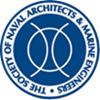Influence of Ship Speed and Heading Profiles on Fatigue Damage Accumulation for a Naval Vessel
IF 1
4区 工程技术
Q3 ENGINEERING, CIVIL
引用次数: 4
Abstract
Ship speed and heading distributions are essential inputs for spectral fatigue analysis, and both may depend on wave conditions. Because rough-weather operational changes are rarely well defined, uncertainties in these distributions can introduce error in fatigue assessments. The influence of speed and relative heading distribution on fatigue estimates has not been thoroughly examined in the existing literature. This study investigates the influence of ship speed and relative heading distributions on fatigue damage accumulation of two sister naval ships. To represent uncertainties, 16 different operating profiles were used, including a baseline profile created from operator surveys and measurements. Fatigue damage estimates are calculated from a spectral analysis of four structural locations near midship. A linear frequency-domain seakeeping code provides the wave loads. The corresponding stresses are calculated using linear finite element analysis. Efforts to maintain seakeeping quality and crew readiness are reflected in the baseline profile with rough-weather speed and course changes. Ignoring these operational changes leads to reductions in estimated fatigue damage of up to 34% relative to the baseline estimate. This nonconservative result emphasizes the importance of understanding how operators manage rough wave conditions.舰船航速和航向剖面对疲劳损伤累积的影响
船速和航向分布是谱疲劳分析的重要输入,两者都可能取决于波浪条件。由于恶劣天气的操作变化很少被很好地定义,这些分布中的不确定性可能会在疲劳评估中引入误差。在现有文献中,速度和相对航向分布对疲劳估计的影响尚未得到充分的研究。本文研究了舰船速度和相对航向分布对两艘姊妹舰疲劳损伤累积的影响。为了表示不确定性,使用了16种不同的操作剖面,包括根据运营商调查和测量创建的基线剖面。疲劳损伤估计是通过对船中部附近四个结构位置的光谱分析来计算的。线性频域耐波性代码提供了波浪荷载。采用线性有限元法计算相应的应力。在恶劣天气下的航速和航线变化情况下,保持适航质量和船员准备就绪的努力反映在基线剖面上。忽略这些操作变化,相对于基线估计,估计的疲劳损伤可减少34%。这一非保守的结果强调了理解作业者如何处理粗糙波浪条件的重要性。
本文章由计算机程序翻译,如有差异,请以英文原文为准。
求助全文
约1分钟内获得全文
求助全文
来源期刊

Journal of Ship Research
工程技术-工程:海洋
CiteScore
2.80
自引率
0.00%
发文量
12
审稿时长
6 months
期刊介绍:
Original and Timely technical papers addressing problems of shipyard techniques and production of merchant and naval ships appear in this quarterly publication. Since its inception, the Journal of Ship Production and Design (formerly the Journal of Ship Production) has been a forum for peer-reviewed, professionally edited papers from academic and industry sources. As such, it has influenced the worldwide development of ship production engineering as a fully qualified professional discipline. The expanded scope seeks papers in additional areas, specifically ship design, including design for production, plus other marine technology topics, such as ship operations, shipping economic, and safety. Each issue contains a well-rounded selection of technical papers relevant to marine professionals.
 求助内容:
求助内容: 应助结果提醒方式:
应助结果提醒方式:


